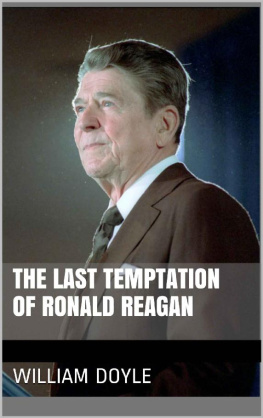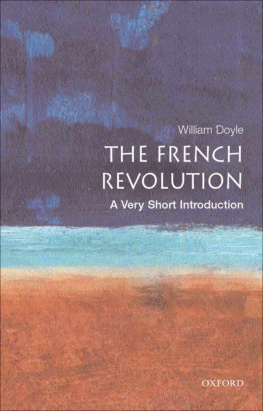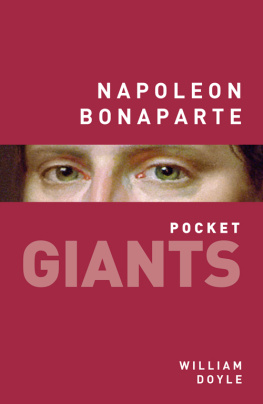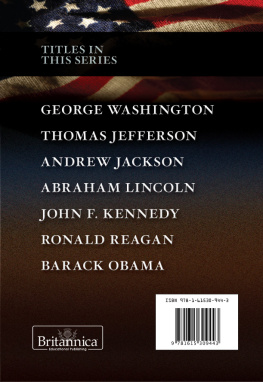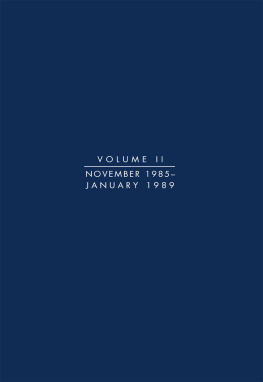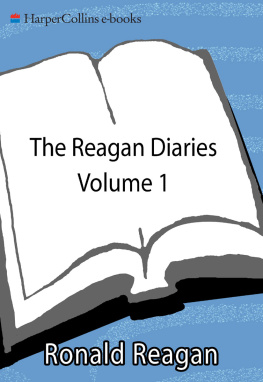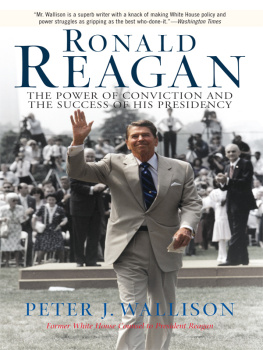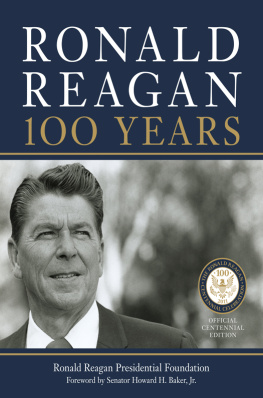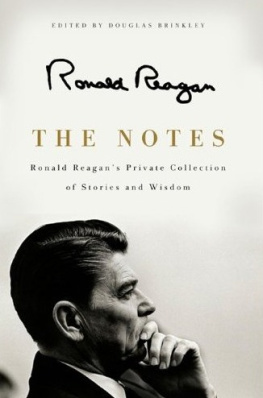William Doyle - The Last Temptation of Ronald Reagan: The Day the Cold War Was Won
Here you can read online William Doyle - The Last Temptation of Ronald Reagan: The Day the Cold War Was Won full text of the book (entire story) in english for free. Download pdf and epub, get meaning, cover and reviews about this ebook. year: 2014, genre: Politics. Description of the work, (preface) as well as reviews are available. Best literature library LitArk.com created for fans of good reading and offers a wide selection of genres:
Romance novel
Science fiction
Adventure
Detective
Science
History
Home and family
Prose
Art
Politics
Computer
Non-fiction
Religion
Business
Children
Humor
Choose a favorite category and find really read worthwhile books. Enjoy immersion in the world of imagination, feel the emotions of the characters or learn something new for yourself, make an fascinating discovery.
- Book:The Last Temptation of Ronald Reagan: The Day the Cold War Was Won
- Author:
- Genre:
- Year:2014
- Rating:4 / 5
- Favourites:Add to favourites
- Your mark:
- 80
- 1
- 2
- 3
- 4
- 5
The Last Temptation of Ronald Reagan: The Day the Cold War Was Won: summary, description and annotation
We offer to read an annotation, description, summary or preface (depends on what the author of the book "The Last Temptation of Ronald Reagan: The Day the Cold War Was Won" wrote himself). If you haven't found the necessary information about the book — write in the comments, we will try to find it.
The Last Temptation of Ronald Reagan: The Day the Cold War Was Won — read online for free the complete book (whole text) full work
Below is the text of the book, divided by pages. System saving the place of the last page read, allows you to conveniently read the book "The Last Temptation of Ronald Reagan: The Day the Cold War Was Won" online for free, without having to search again every time where you left off. Put a bookmark, and you can go to the page where you finished reading at any time.
Font size:
Interval:
Bookmark:
The L ast Temptation
of Ronald Reagan
The Day the Cold War Was Won : October 12, 1986
By William Doyle
Prologue
Two men faced each other across a polished table in a haunted house, on a bleak Arctic island that in medieval times was thought to be a doorway to hell.
Each man was armed with 25,000 nuclear warheads, with the firepower to destroy the world hundreds of times over. Their two nations had been in a state of imminent war for almost three decades, and their nuclear arsenals were on hair-trigger alert, waiting for the slightest mistake or computer glitch to plunge the world into the flames of Armageddon.
The first man was a career Communist functionary named Mikhail Gorbachev, the leader of the ruling collective dictatorship of the Soviet Union.
The second man, President Ronald Reagan, was an elderly former actor and ex-governor of California. He was a sunny, optimistic visionary, and he dreamed of changing the history of the world by destroying communism. But few people fully realized that Reagan had another, equally powerful dream, and it was a fantastic, radical vision: He wanted to destroy all the nuclear weapons on the face of the earth.
What Ronald Reagan was about to do to achieve this vision was so amazing, and in the opinion of some American officials so dangerous, that Reagans own national security adviser seized all copies of the top-secret record of the event and blocked most of Reagans aides from seeing or copying it. For years, the highly classified document was sealed off inside the White House and then locked away in the National Archives, until the author of this book forced its release to the public through the Freedom of Information Act.
This is the story of four hours in American history. It is the story of how Ronald Reagan achieved his ultimate destiny behind closed doors during the highest-risk negotiation in modern history. And it is the story of how, in one astonishing encounter, Reagan proved himself to be not only one of the greatest giants of American Conservatism but also an unsung American Liberal superhero, by advancing the cause of nuclear arms reductions much further and much more forcefully than any other American president.
At about 6:10 p.m. on October 12, 1986, an idea that had been floating in Ronald Reagans mind landed on the negotiating table in a way that it never had before and never would since.
It would be fine with me, announced the president, if we eliminated all nuclear weapons! In one fell swoop, Reagan was trying to slash through the 40-year jungle of the nuclear arms race.
It was the ultimate blasphemy in nuclear theology and the most electrifying moment in nuclear history since the climax of the resolution of the Cuban Missile Crisis on October 27, 1962. In the space of about 20 minutes, the two leaders were crashing through all categories of nuclear weapons.
Reagans stunning phrase hung in the air. It was the most radical phrase ever uttered in a nuclear arms negotiation the statement of total abolition.
We can do that, replied Mikhail Gorbachev. We can eliminate them.
There were no American or Soviet nuclear weapons left to discuss. They were all on the table and all seemingly about to be dealt away. Gorbachev and Reagan had flown far beyond the theoretical limits of arms control.
Reagan announced grandly, If we can agree to eliminate all nuclear weapons, I think we can turn it over to our Geneva people with that understanding, for them to draft up that agreement, and you can come to the United States and sign it.
I agree, replied the general secretary.
For a moment, the two men stood alone at the absolute summit of the Cold War eraand together, they seemed to be opening a doorway to a possible nuclear-free age.
October 12, 1986
3: 20 P.M.
The Gates of Hell
T hree hours earlier, President Ronald Reagan sat by a cottage window overlooking a gloomy, mist-cloaked bay on the edge of the Icelandic capital city of Reykjavk, listening to his officials debate the fate of the Earth.
The president was about to go downstairs to join Soviet Premier Mikhail Gorbachev in the little conference room of Hofdi House for the final session of a chaotic superpower summit that was running off the rails.
It was a meeting that both Reagan and Gorbachev would later agree was the great turning point in the Cold War. In his memoirs, Reagan would call it one of the longest, most disappointing and ultimately angriest days of my presidency.
In the 1980s, the Cold War had heated up to its highest levels since the Cuban Missile Crisis of 1962. Tension between the worlds two superpowers had escalated in the early 1980s; the period of dtente that had marked the previous decade ended abruptly as the Soviet Union went to war in Afghanistan in 1979, and tensions rose further in 1983 when the Soviet Union shot down a Korean Air Lines jetliner, killing scores of American citizens.
In 1985, Mikhai l Gorbachev took over leadership of the Soviet Union, and with his arrival came hints that he might find common ground with an American president who harbored his own ambitions for a stand-down on the issue of nuclear weapons a former movie star turned politician named Ronald Reagan. Reagan had set about to build a conservative revolution in the United States and to impose a simple view of foreign policy abroad. In 1977, Reagan declared: My idea of American policy toward the Soviet Union is simple, and some would say simplistic. It is this: We win and they lose.
But when Gorbachev came to power, an odd alliance s oon appeared possible between two men who shared the view that nuclear disarmament was not only conceivable, but necessary. Even against the backdrop of a strongly anti-Soviet stance, Reagan clung to a personal belief that nuclear weapons had to be eliminated from the equation of power. In public, both Reagan and Gorbachev had made appeals for the elimination of all nuclear weapons, as had most U.S. and Soviet leaders since the beginning of the nuclear age. But until this moment in time, the statements had served only as empty propaganda pirouettes and had never come close to an actual negotiation.
Standing a few feet away from the president was Richard Perle, Reagans shaggy-haired 45-year-old assistant secretary of defense for international security policy, a man who was arguably the most feared and powerful bureaucrat in Washington and a man who had a talent for grabbing history by the throat and shoving it in his chosen direction.
In 1972, as a young aide to super-hawk Democratic Senator Henry Scoop Jackson, Perle helped attach restrictions to the Senates passage of the Nixon-Kissinger SALT I nuclear treaty with the Soviets requiring that future nuclear arms control agreements be based on numerical equality of weapons. In 1974, he drafted the Jackson-Vanik amendment, which linked U.S.Communist trade deals to human-rights progress and later was credited with forcing major improvements in Soviet emigration policies. In 1979 and 1980, he helped lead the opposition to U.S. Senate approval of Jimmy Carters SALT II treaty, a campaign that successfully killed the treaty, though its provisions were tacitly adhered to by both sides.
Over the next quarter-century, Perle would serve as the shadow overlord of triumphalist global American neo-conservatism, stewarding a flock of acolytes and ideological cronies like Paul Wolfowitz, Dick Cheney, Donald Rumsfeld, Ahmad Chalabi and Douglas Feith, a crusade that later culminated in Perles decisive role in plunging the Bush administration into the Iraq War.
Richard Perle was a character so rich with potboiler color that he might as well have been sketched by a Ludlum or Le Carr. Saturated with a silky, mellow charm, he practically purred as he worked the phones with journalists, spinning and plotting and chuckling in a voice as smooth as crushed velvet. He was fawned over in breathless press profiles as rumpled, plump-cheeked, and looking like someones discarded teddy bear. Co-workers accused him of being late in his work, missing meetings, and being both completely disorganized and very difficult to work with.
Next pageFont size:
Interval:
Bookmark:
Similar books «The Last Temptation of Ronald Reagan: The Day the Cold War Was Won»
Look at similar books to The Last Temptation of Ronald Reagan: The Day the Cold War Was Won. We have selected literature similar in name and meaning in the hope of providing readers with more options to find new, interesting, not yet read works.
Discussion, reviews of the book The Last Temptation of Ronald Reagan: The Day the Cold War Was Won and just readers' own opinions. Leave your comments, write what you think about the work, its meaning or the main characters. Specify what exactly you liked and what you didn't like, and why you think so.

